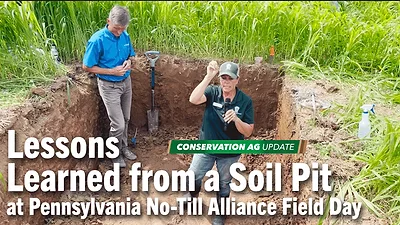When farming gets tough, farmers get creative.
Mark Muench, of Muench Farms Grain and Cattle Co., in rural Ogden, switched to strip-tillage in 2002 with the goal of building organic matter and reducing erosion to preserve the soil while still achieving maximum yields.
The problem was, at the time, strip-till was pretty new, so those who wanted to try it had to convert existing tillage iron to perform the reduced-tillage function they wanted.
There was a lot of trial and error a decade ago.
In 2006, he began growing continuous corn and the challenge only grew as he struggled to go through heavy crop residue, fighting inevitable plugging without success.
"I tried several brands and discovered most strip-till equipment worked well only under ideal conditions," Muench said. "They would plug up in heavy residue and not create a good berm in the fall for spring planting plus they created windrows of trash affecting seedling health."
In his search for tillage equipment able to do what he expected, he found Salford.
The standard Salford tillage tool had a rolling basket and harrower and concave coulters in the back that didn't build a soil berm that he was looking for in a tool.
"When I saw how well Salford worked in tough conditions," Muench said, "I quickly realized it was the product for my needs.
"I added shanks with mole knives running 7 to 8 inches deep (at) every 30 inches to get under any compaction, then added the extreme coulters to create the berm."
But he turned the coulters in toward each other to build the 4- to 5-inch berm, preceded by mole knifes with attached pneumatic tubes for applying anhydrous ammonia at what would be the root level.
Using his Osceola-manufactured Salford equipment with his custom set up, Muench said he can strip-till in the fall, then plant seeds and apply fertilizer into the berm in the spring.
"My goal is to provide the best chance of success for every seed I plant while taking care of and improving the soil," Muench said.
Muench's success with his alteration of Salford's machine has led Salford to use his design as standard on its strip-till toolbar.
He also became a dealer for the company.
"After all the frustration I went through finding the right equipment for strip-tilling, I wanted to help other farmers adopt the process successfully," Muench said. "Working with Salford led to an opportunity to help advance strip-till and start my full service equipment dealership.
That full-service includes being a dealer for MonTag fertilizer equipment, Orthman guidance systems and Weiss tillage systems. By bring all these companies together, he said he thinks he can provide a turn-key tillage system, plus service, for farmers who want to try strip-till by doing little more than hooking on and working soil.
"I really enjoy helping farmers improve their tillage operations and gladly share my experience with them," Muench said. "My dealership is built to offer everything I expect from a vendor - sales, service, parts and convenience."
His new business, Muench AgriSolutions, is located on the family farm northwest of Ogden.
As Muench has worked with Salford, staff there recognized the benefits of Muench's alterations and will begin offering it as a standard option in 2013.
Muench said a desire to take care of the soil long-term, without losing yield, is what attracted him to using strip-till. The 15-bushel-per-acre yield bump that he saw in years one and two kept him interested.
"It's like planting in a flower pot," Muench said. "Everything for the plant is right there."
The berm "is a real nice environment to plant into," Muench said. "At least during a normal spring."
2013's wet, cool spring has created some crop challenges by planting later in the year and putting seed in the ground that he normally would consider as too wet.





